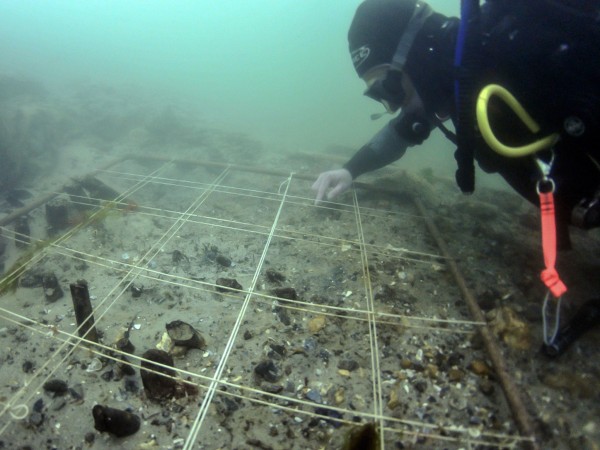 A submerged archaeological site off the southern coast of
England has yielded DNA from 8,000-year-old wheat. At the time,
Mesolithic Britons were hunter-gatherers, but the DNA, collected from
the sediments of the Solent, the strait separating the Isle of Wight
from mainland England, suggests that they maintained social and trade
networks with the Neolithic farmers of mainland Europe. “Common
throughout Neolithic Southern Europe, einkorn is not found elsewhere in
Britain until 2,000 years after the samples found at Bouldnor Cliff. For
the einkorn to have reached this site there needs to have been contact
between Mesolithic Britons and Neolithic farmers far across Europe. The
land bridges provide a plausible facilitation of this contact. As such,
far from being insular Mesolithic Britain was culturally and possibly
physically connected to Europe,” said Robin Allaby of the University of Warwick,
who co-led the research team with Vincent Gaffney of the University of
Bradford and Mark Pallen of Warwick Medical School, the Maritime
Archaeology Trust, the University of Birmingham, and the University of
St. Andrews. “The use of ancient DNA from sediments also opens the door
to new research on the older landscapes off the British Isles and
coastal shelves across the world,” Gaffney added. To read more about
early domestication, see "The Origins of Staple Foods Studied."
A submerged archaeological site off the southern coast of
England has yielded DNA from 8,000-year-old wheat. At the time,
Mesolithic Britons were hunter-gatherers, but the DNA, collected from
the sediments of the Solent, the strait separating the Isle of Wight
from mainland England, suggests that they maintained social and trade
networks with the Neolithic farmers of mainland Europe. “Common
throughout Neolithic Southern Europe, einkorn is not found elsewhere in
Britain until 2,000 years after the samples found at Bouldnor Cliff. For
the einkorn to have reached this site there needs to have been contact
between Mesolithic Britons and Neolithic farmers far across Europe. The
land bridges provide a plausible facilitation of this contact. As such,
far from being insular Mesolithic Britain was culturally and possibly
physically connected to Europe,” said Robin Allaby of the University of Warwick,
who co-led the research team with Vincent Gaffney of the University of
Bradford and Mark Pallen of Warwick Medical School, the Maritime
Archaeology Trust, the University of Birmingham, and the University of
St. Andrews. “The use of ancient DNA from sediments also opens the door
to new research on the older landscapes off the British Isles and
coastal shelves across the world,” Gaffney added. To read more about
early domestication, see "The Origins of Staple Foods Studied."
Thursday, March 5, 2015
Domestic Grain DNA Discovered in Mesolithic Britain
 A submerged archaeological site off the southern coast of
England has yielded DNA from 8,000-year-old wheat. At the time,
Mesolithic Britons were hunter-gatherers, but the DNA, collected from
the sediments of the Solent, the strait separating the Isle of Wight
from mainland England, suggests that they maintained social and trade
networks with the Neolithic farmers of mainland Europe. “Common
throughout Neolithic Southern Europe, einkorn is not found elsewhere in
Britain until 2,000 years after the samples found at Bouldnor Cliff. For
the einkorn to have reached this site there needs to have been contact
between Mesolithic Britons and Neolithic farmers far across Europe. The
land bridges provide a plausible facilitation of this contact. As such,
far from being insular Mesolithic Britain was culturally and possibly
physically connected to Europe,” said Robin Allaby of the University of Warwick,
who co-led the research team with Vincent Gaffney of the University of
Bradford and Mark Pallen of Warwick Medical School, the Maritime
Archaeology Trust, the University of Birmingham, and the University of
St. Andrews. “The use of ancient DNA from sediments also opens the door
to new research on the older landscapes off the British Isles and
coastal shelves across the world,” Gaffney added. To read more about
early domestication, see "The Origins of Staple Foods Studied."
A submerged archaeological site off the southern coast of
England has yielded DNA from 8,000-year-old wheat. At the time,
Mesolithic Britons were hunter-gatherers, but the DNA, collected from
the sediments of the Solent, the strait separating the Isle of Wight
from mainland England, suggests that they maintained social and trade
networks with the Neolithic farmers of mainland Europe. “Common
throughout Neolithic Southern Europe, einkorn is not found elsewhere in
Britain until 2,000 years after the samples found at Bouldnor Cliff. For
the einkorn to have reached this site there needs to have been contact
between Mesolithic Britons and Neolithic farmers far across Europe. The
land bridges provide a plausible facilitation of this contact. As such,
far from being insular Mesolithic Britain was culturally and possibly
physically connected to Europe,” said Robin Allaby of the University of Warwick,
who co-led the research team with Vincent Gaffney of the University of
Bradford and Mark Pallen of Warwick Medical School, the Maritime
Archaeology Trust, the University of Birmingham, and the University of
St. Andrews. “The use of ancient DNA from sediments also opens the door
to new research on the older landscapes off the British Isles and
coastal shelves across the world,” Gaffney added. To read more about
early domestication, see "The Origins of Staple Foods Studied."


No comments:
Post a Comment